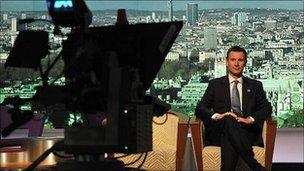Local TV news could be sponsored
- Published

Jeremy Hunt said he hoped around 50 new local TV stations would be on air by the next general election
Dozens of new local TV stations could be the first broadcasters in the UK to have sponsored news bulletins, Culture Secretary Jeremy Hunt has said.
"News programmes at the moment can't be sponsored and I would like to find a way of getting around that if I can," he told a summit on plans for local TV.
Mr Hunt wants around 50 new local TV stations to open by 2015.
But there must be a mechanism to make sure that the news remains independent and impartial, he added.
Speaking in Birmingham, he said the sponsorship of bulletins could provide crucial funds for the fledgling stations.
He said he would "look at the law in this respect", but added that regulations meant it would be difficult to achieve.
"We are looking to find ways to enable them to get revenue in any way they can, and if we can find a way that allows them to get sponsorship of certain programmes in a way that doesn't breach the current broadcasting code, then that's what we'd like to do."
However, allowing companies to sponsor news programmes is currently prohibited by media regulator Ofcom's code and by EU regulations.
A spokeswoman for the Department for Culture, Media and Sport said the government was "keen to maximise the revenue sources available to local TV stations".
"One way of doing this would be to increase sponsorship opportunities," she said.
"The law prohibits the sponsorship of news but, as we are drawing up the licences for the new TV stations, we are looking at what we may be able to do within the existing rules.
"Whatever we do though we would insist on robust impartiality, accuracy and fairness rules remaining in place."
'Great concern'
Debra Davis of City TV, which is bidding to run the Birmingham channel, said she would support the move.
"You want to make sure local TV is commercially viable," she said. "Most people watch the news and you'd be able to sell the [advertising] time in and around the news quite well, for good rates.
"How it's done creatively and editorially needs some consideration. Commercial and editorial will always be separated."
Broadcasters would not compromise their integrity by giving sponsors special treatment, she added. "You would ruin your reputation. You couldn't do that, you wouldn't do that."
Jocelyn Hay from the Voice of the Listener and Viewer said the notion of local news sponsorship was a matter of "great concern".
"At the very least, programme makers minimise the danger of offending sponsors by avoiding active criticism and controversial subjects. The result is bland programming and a lack of investigative journalism, which contributes little to local democracy or holding local politicians to account," she added.
Mr Hunt added that rules on political impartiality and taste and decency would not be relaxed for the local stations.
The government has just published a list of 65 locations where local TV services could potentially broadcast. Around 20 initial licences will be awarded next year, with the first stations going on air in 2013.
They are likely to be broadcast on Freeview on channel eight in England and Northern Ireland, with another channel to be found in Scotland and Wales.
- Published9 August 2011
- Published5 July 2011
- Published19 January 2011